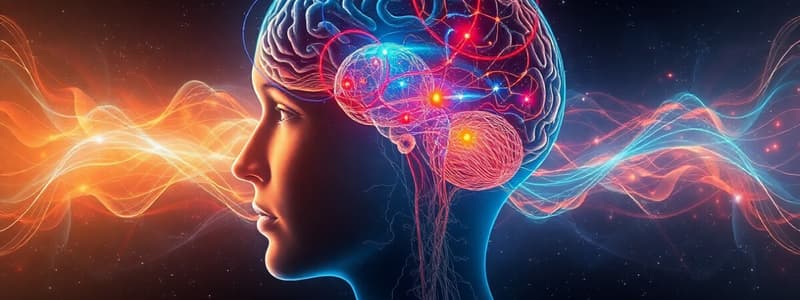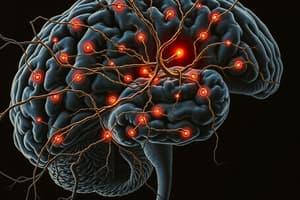Podcast
Questions and Answers
What is the main function of gray matter in the brain?
What is the main function of gray matter in the brain?
- Digestive processes
- Circulatory control
- Regulation of autonomic functions
- High level functioning, memory and communication (correct)
What are the consequences of damage to the frontal lobe?
What are the consequences of damage to the frontal lobe?
- Loss of sensory perception
- Inability to read and interpret texts
- Reduction in visual processing
- Impairment in voluntary skeletal actions, speech, and emotions (correct)
What might be an indication of a stroke based on motor skills?
What might be an indication of a stroke based on motor skills?
- Symmetrical body movements
- Enhanced reflex response
- Unsteady gait and deviation to one side (correct)
- Increased balance and coordination
Which area of the brain is primarily responsible for processing auditory impulses?
Which area of the brain is primarily responsible for processing auditory impulses?
What are potential symptoms of a stroke affecting sensory perception?
What are potential symptoms of a stroke affecting sensory perception?
Which function is associated with the parietal lobe of the brain?
Which function is associated with the parietal lobe of the brain?
What is a common sign of both neurological injury and stroke?
What is a common sign of both neurological injury and stroke?
What does the term 'fight or flight' refer to?
What does the term 'fight or flight' refer to?
What might explain issues with swallowing in patients with certain neurological conditions?
What might explain issues with swallowing in patients with certain neurological conditions?
What could be an impact of alcohol consumption on neurological function?
What could be an impact of alcohol consumption on neurological function?
Which function is primarily associated with the frontal lobe?
Which function is primarily associated with the frontal lobe?
What cognitive function is linked to the temporal lobe?
What cognitive function is linked to the temporal lobe?
Which symptom could indicate a stroke related to sensory perception?
Which symptom could indicate a stroke related to sensory perception?
Which condition is characterized by a decline in memory and cognitive abilities?
Which condition is characterized by a decline in memory and cognitive abilities?
What does the term 'rest and digest' refer to?
What does the term 'rest and digest' refer to?
Which of the following might cause issues with swallowing?
Which of the following might cause issues with swallowing?
What might an unsteady gait and arm deviation indicate?
What might an unsteady gait and arm deviation indicate?
Which of the following is NOT a common sign of neurological injury?
Which of the following is NOT a common sign of neurological injury?
What role does gray matter play in brain function?
What role does gray matter play in brain function?
What mental function can be attributed to the occipital lobe?
What mental function can be attributed to the occipital lobe?
Flashcards are hidden until you start studying
Study Notes
Coordinating and Regulating Body Functions
- The body has two main states: "fight or flight" and "rest and digest".
- "Fight or flight" is activated during times of stress, preparing the body for action.
- "Rest and digest" restores the body's functions after stress.
The Brain
- The brain is divided into different regions, each with specific functions.
- The gray matter is responsible for high-level functioning, including memory, communication, perception, and voluntary movements.
- The frontal lobe controls voluntary skeletal actions, talking, writing, emotions, and behavior.
- The temporal lobe receives impulses from the ear and interprets sound.
- The parietal lobe processes tactile sensations.
- The occipital lobe is responsible for visual processing and reading.
- The basal ganglia controls movement and coordination.
- The thalamus is the relay center for sensory information.
- The hypothalamus controls basic functions like temperature, hunger, and thirst.
Balance
- The cerebellum is responsible for balance and coordination.
Motor Control
- Gross movements are large, coordinated movements.
- Fine movements are precise and small movements.
Sensory Deficits
- Numbness, tingling, and memory issues can be symptoms of neurological problems.
- Seizures, strokes, and spinal cord injuries can cause these symptoms.
Dementia and Alzheimer's Disease
- Dementia is a general term for cognitive decline that impacts daily living.
- Alzheimer's disease is a specific type of dementia characterized by plaque and tangle buildup in the brain.
- Strokes can also lead to dementia-like symptoms.
Swallowing and Speech Issues
- Dysphagia (swallowing difficulties) can be caused by neurological problems, alcohol consumption, and water consumption.
- Aphasia (language difficulties) can be caused by neurological problems and alcohol consumption.
Spinal Cord Compression
- Spinal cord compression can occur during pregnancy, putting pressure on the fetus and potentially causing neurological problems.
Neurological Assessment
- Oriented x 3 refers to a patient being oriented to person, place, and time.
- Pain sensation is tested by assessing a patient's ability to feel pain.
- Temperature sensation is tested by assessing a patient's ability to feel hot and cold.
- Vibration sensation is tested by using a tuning fork to see if the patient can feel vibrations.
- Fine sensation is tested by assessing a patient's ability to feel light touch.
Neurological Signs
- Rapid twitching of resting muscles can indicate neurological problems.
- Tongue deviation can indicate a stroke.
- Unsteady gait can also indicate a stroke.
- Movement deviation to one side can indicate a stroke.
- Decreased sensation, absent pain sensation, or increased pain sensation can indicate a neurological problem.
- Stroke or spinal cord issues can cause neurological problems.
Reflexes
- Distraction can interfere with reflex testing.
- Reflex responses are essential for proper neurological function.
- Absent reflexes can indicate a neurological problem.
Arm Movements
- Arm folding in indicates a specific neurological response pattern.
- Arm going out indicates another specific neurological response pattern.
Coordinating and Regulating Body Functions
- Fight or Flight Response: Triggered by stress, prepares the body to respond to threats.
- Rest and Digest Response: Opposite of fight-or-flight, promotes relaxation and restores body functions.
Brain Structure and Function
- Gray Matter: Key for higher-level functions like memory, communication, perception, and voluntary movements.
- Frontal Lobe: Responsible for voluntary skeletal actions, talking, writing, emotions, and behavior.
- Temporal Lobe: Receives impulses from the ear, interprets sound, and houses Wernicke's area (language comprehension).
- Parietal Lobe: Processes tactile sensations.
- Occipital Lobe: Responsible for visual processing and reading.
Brain Injuries: Causes and Symptoms
- Spinal Cord Injuries: Can result in numbness, tingling, sensory issues, and memory problems.
- Dementia, Alzheimer's, and Strokes: Can cause a wide range of cognitive and physical impairments.
- Ligament/Muscle Injuries: May cause swallowing difficulties.
- Alcohol and Water Consumption: Can lead to speech problems.
- Fetal Compression of Spinal Cord: Possible cause of neurological abnormalities in newborns.
Physical Examination Observations
- Oriented x 3: Refers to a patient's awareness of person, place, and time.
- Pain, Temperature, Vibrations, and Fine Sensations: Assessed to determine sensory function.
- Rapid Twitching of Muscles, Including the Tongue: Sign of a stroke or other neurological disorder.
- Unsteady Gait, Movement Deviation, and Decreased Sensation: Possible indications of neurological impairments.
- Absent or Increased Pain Sensation: May point to nerve damage or other neurological conditions.
Reflex Testing and Other Observations
- Reflex Responses: Tested to assess the integrity of the nervous system.
- Distraction: Can interfere with reflex testing.
- Arm Folding/Extending: Used to assess specific reflexes.
Baby Bites
- Babies: May bite out of instinct or as a sign of teething.
- Brothers and Sisters: May experience "love bites" that can seem silly.
- Mothers: May be affected by baby bites, experiencing pain and needing to adjust to their baby's behavior.
Drooping Eyelids
- Drooping Eyelids: May be a symptom of fatigue, neurological disorders, or certain medical conditions.
Stroke
- Stroke Symptoms: Include rapid muscle twitching, especially of the tongue.
- Unsteady Gait: A common symptom of a stroke.
- Movement Deviation: May occur towards one side of the body, indicating a stroke.
- Decreased Sensation: A hallmark of stroke affecting a specific area of the body.
- Stroke versus Spinal Cord Issue: Both can present with similar symptoms, requiring careful diagnosis.
Studying That Suits You
Use AI to generate personalized quizzes and flashcards to suit your learning preferences.



